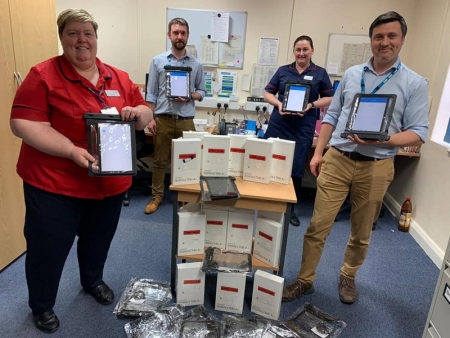
With the support of a knowledgeable IT team, certain key areas at Doncaster and Bassetlaw Teaching Hospital’s (DBTH) are now able to facilitate ‘’virtual visiting’’, so that vulnerable patients can keep in touch with their loved during this stressful time. The facility has already been enabled for both the Special Care Baby Unit (SCBU) and the End of Life Care team, although plans are being developed to make the innovation more widely available in the coming months.
For context, SCBU look after little ones who require special care and attention, be that because of premature birth, antenatal concerns, or other severe complications. Meanwhile, the End of Life department are responsible for those with chronic illnesses, like cancer, kidney failure, Alzheimer’s or cardiac disease. Also known as ‘’palliative care’’, they will help patients manage their physical pain symptoms, help with day-to-day activities like washing and dressing, and also provide emotional support to relatives and friends.
This last part has become increasingly difficult in recent weeks, due to the ongoing COVID-19 situation and the associated social distancing measures that have been put in place across the country. Whilst certain allowances have been made to ensure that those receiving palliative care are able to still have visitors, the restrictions are tighter than usual, with a strict limitation being placed on how long visits may last and how many people can be present for them.
As such, the End of Life Care team has been working tirelessly to adapt their service, so that it is more accommodating during the ongoing pandemic. For example, loved ones can now keep in touch with patients by emailing a letter to dedicated volunteers dbth.butterflyvolunteer@nhs.net who will then print off these messages and hand them over to the intended recipient, in a way that is safe and wholly compliant with infection prevention control protocols. What’s more, if the recipient is unable to read their letter, then a member of staff will be able to speak it aloud for them.
Likewise, the team are also arranging ‘’virtual visits’’, whereby they can connect patients to their families and friends using android devices. Newly introduced by the Trust’s IT department, these video calls are coordinated by ward staff and help people get together remotely, without having to worry about the restrictions that would apply for an in-person visit.
Speaking about this, Karen Lanaghan, Lead Nurse End of Life Care Services, said: ‘’Being able to communicate with one another is of the utmost importance for our patients and their families, as no one should face their last days alone. However, the global situation has unfortunately forced us to curtail visits, for the sake of wider patient safety. By having access to this technology, we can at least provide a way through which people can speak to their loved ones, see their faces, and feel together.’’
In terms of SCBU, virtual visiting will enable mums and dads who are currently self-isolating to still have some form of contact with their baby. Having a child on the unit can be very distressing, a feeling which is compounded by not being able to physically be there with them. By giving parents the opportunity to video call their little ones, SCBU hopes to soften this hardship and provide some much-needed intimacy.
Scott Ashmore, ICT Network Manager at the Trust and lead for the Virtual Visiting project, said: ‘’I am fortunate to work with such a dedicated team. Together, we have been working very hard to introduce this brand-new facility into the Trust. This is obviously a very trying time for all, and we are just doing what we can to make things a little bit easier. I really hope that patients and their loved ones take some comfort and reassurance in knowing that, despite everything that is going on, they can keep in touch whilst in hospital.’’
The technology that is used to facilitate virtual visits are being rolled out across the Trust, starting with the areas that have the highest need. As more of the devices are sourced, then the facility will be made more widely available.
